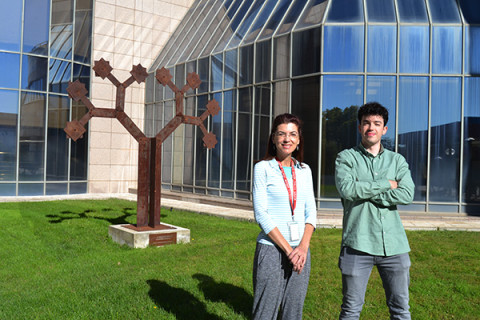Carlos José Sánchez gets the First Arquímedes Award for his TFG done at ICMM-CSIC with Elsa Prada

Carlos José Sánchez Martínez, a graduate in Physics from the Autonomous University of Madrid, has been awarded the First Arquimedes Prize for his Bachelor's Thesis, which he completed at the Materials Science Institute of Madrid (ICMM-CSIC) under the supervision of researcher Elsa Prada. The prize is worth 6,000 euros for the student and an additional 2,000 euros for the supervisor.
The thesis is titled 'Majorana Oscillations in Full-shell Hybrid Nanowires,' and in it, the researcher and his supervisor propose a method for finding Majorana modes. "We propose a configuration for the nanowire, and we observe that indeed, oscillations appear that would serve as indicators of the existence of Majorana modes in these types of systems," explains the researcher.
"It's a very attractive topic because two pairs of Majorana modes could form a topological qubit. Building a computer with these qubits would protect it from most errors or decoherence," he proudly remarks. After completing his Bachelor's Thesis and winning the award, both he and Prada are working to turn this research into a research paper in a prestigious journal. "That's the next step," they point out.
But this young man's career is just beginning, and he's not stopping there. He has already completed his Master's in Condensed Matter Physics in Biological Systems with a specialization in Nanophysics, and he has recently enrolled in a doctoral program, this time in quantum optics. "After all, the ideas I've worked on with Elsa Prada, related to topology, can be applied here. I believe that change is enriching; you can see parallels and draw from different fields," says Sánchez.
This naturally curious young man is determined to pursue a career in research. "You have to like it; sometimes, it's not very well recognized," he acknowledges. "I prefer to always place myself at the frontier of knowledge. Every day is a new adventure," he confidently states. Prada adds, "I saw that he could have a future in academia when I met him."
"The work on the Bachelor's Thesis is very intense," continues the researcher, explaining that she not only taught Sánchez general research skills and topology but also introduced him to numerical calculations "so that he could run simulations." "It was an intense period, but he did very well, and now we have this bonus of the award," she adds.
The Arquimedes Competition, organized by the Ministry of Universities, aims to promote scientific research among university students by rewarding the best research projects in all areas of knowledge carried out by undergraduate and master's students from Spanish universities. Out of 530 submissions, only 25 made it to the final, where the selected students had to prepare a presentation that would be engaging for people from other fields of knowledge. An exercise that also raises awareness about the importance of science communication: "I tried to adapt it as best as I could; it's a challenge." And the result is well-known: a well-deserved and motivating first prize for him and his supervisor.
Instituto de Ciencia de Materiales de Madrid (ICMM)
Sor Juana Ines de la Cruz, 3
Cantoblanco, 28049
Madrid, España
Telephone: (+34) 91 334 90 00
Email: @email
Communication Office: @email

Acknowledge the Severo Ochoa Centres of Excellence program through Grant CEX2024-001445-S/ financiado por MICIU/AEI / 10.13039/501100011033

Contacto | Accesibilidad | Aviso legal | Política de Cookies | Protección de datos
